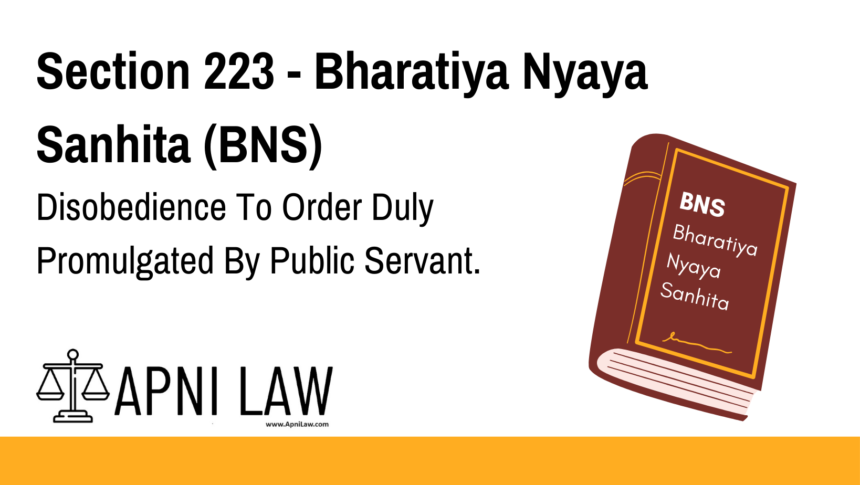Code: Section 223 BNS
Whoever, knowing that, by an order promulgated by a public servant lawfully
empowered to promulgate such order, he is directed to abstain from a certain act, or to take
certain order with certain property in his possession or under his management, disobeys
such direction,––
(a) shall, if such disobedience causes or tends to cause obstruction, annoyance
or injury, or risk of obstruction, annoyance or injury, to any person lawfully employed,
be punished with simple imprisonment for a term which may extend to six months, or
with fine which may extend to two thousand and five hundred rupees, or with both;
(b) and where such disobedience causes or tends to cause danger to human
life, health or safety, or causes or tends to cause a riot or affray, shall be punished
with imprisonment of either description for a term which may extend to one year, or
with fine which may extend to five thousand rupees, or with both.
Explanation.—It is not necessary that the offender should intend to produce harm,
or contemplate his disobedience as likely to produce harm. It is sufficient that he knows of
the order which he disobeys, and that his disobedience produces, or is likely to produce,
harm.
Illustration.
An order is promulgated by a public servant lawfully empowered to promulgate
such order, directing that a religious procession shall not pass down a certain street. A
knowingly disobeys the order, and thereby causes danger of riot. A has committed the
offence defined in this section.
Explanation of Section 223 BNS
Section 223 of the Bharatiya Nyaya Sanhita, 2023 (BNS) deals with the offense of disobeying an order issued by a public servant. This section ensures that legally issued orders are followed to maintain law and order.
Key Aspects of Section 223 BNS
- Duly Promulgated Order: The order must be issued by a legally authorized public servant.
- Knowingly Disobeyed: The individual must be aware of the order but deliberately disobeys it.
- Public Safety Concern: The order must be related to maintaining law, order, or public welfare.
- Punishment:
- General Disobedience → Up to 6 months imprisonment or ₹10,000 fine.
- If Life or Safety is Endangered → Up to 1-year imprisonment.
Illustration
Example 1: Violating a Curfew Order
During a riot, the district magistrate imposes a curfew. A person deliberately steps out without a valid reason and is caught by the police. This amounts to an offense under Section 223 BNS.
Example 2: Disobeying a Public Health Order
During a pandemic, health officials order individuals to follow quarantine measures. A person deliberately violates the order and spreads the disease, leading to prosecution under this section.
Example 3: Ignoring a Prohibition Notice
A government officer prohibits public gatherings in a sensitive area. If a group organizes a protest despite the order, they can be charged under Section 223 BNS.
Common Questions and Answers on Section 223 BNS
1. What constitutes a “duly promulgated order”?
An order issued by a legally empowered public servant (such as police officers, magistrates, or health officials) for public welfare.
2. What happens if someone unintentionally disobeys an order?
If the person was unaware of the order or had a genuine reason for non-compliance, they may not be held liable. The offense requires intentional disobedience.
3. Is this offense bailable?
Yes, in general cases, the offense is bailable. However, if the disobedience causes danger to human life or safety, it may be treated more seriously.
4. What is the maximum punishment for violating Section 223 BNS?
- Regular cases: Up to 6 months of imprisonment or ₹10,000 fine.
- If it endangers life or safety: Up to 1 year of imprisonment.
Conclusion
Section 223 BNS ensures compliance with legally issued orders by public officials to maintain public safety and order. It prevents reckless actions that could jeopardize society.
For expert legal insights, visit ApniLaw today! 🚀








